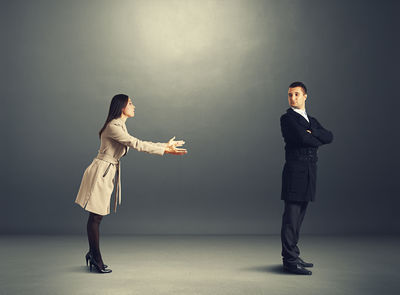I’m Better than You!!
How Grandiosity and Unworthiness are Dangerous Traps
If you’ve ever felt the “I’m better than you” vibe from someone, then you know what it feels like to be on the other end of grandiosity. Irritating? Feeling small? Angry? What about when someone is expressing how unworthy they feel, saying things like, “I don’t know what’s wrong with me,” “I’m so flawed,” “I hate myself.” Maybe we feel compassion for awhile. Then perhaps we feel overwhelmed or like we want to get away. Most of us have not only experienced another’s grandiosity, we’ve been grandiose too. We’ve not only experienced another’s unworthiness, we’ve felt unworthy ourselves. The unfortunate outcome of all of this is that grandiosity and unworthiness separates us from others and leaves us feeling alone.

Have you heard of grandiosity? Probably. Here are some synonyms: pompous, pretentious, superior, feeling above or better than others.
You’re probably also well aware of “unworthiness.” Simply put, it means having little value or merit. As an attitude it means feeling ashamed and less than someone else or others.
Years ago, I had the good fortune to learn from an outstanding psychotherapist, Terry Real of Boston, that all of us have experienced both grandiosity and unworthiness. Yet most of us have developed a pattern that leans toward one or the other end of the continuum. I like the way that Terry Real uses simplified terms for grandiosity, “feeling one-up,” and for unworthiness, “feeling one-down.”
The most basic fault of being one-up or one-down is that they don’t work in our favor. Why? Because love, respect, and connection come only when two people feel equal to each other. Being self-righteous or needing to be right or better doesn’t resolve things. Not speaking up, giving in, or withdrawing doesn’t either.
One or more of the following qualities often accompany being one-up – anger, indifference, passive-aggression, critical and needing to be in control. One or more of these qualities often accompany being one-down – desperation, manipulation, begging, resignation, depression, and low self-esteem.
It’s important to stay clear of judging those who go one-up or one-down because these strategies are usually learned in childhood in order to get our needs met.
- Some children witnessed a parent being either one-up or one-down and unconsciously copied their behaviors.
- Some children were made to feel they could do no wrong and were unrealistically praised for winning and being better than others. In this, grandiosity is born.
- Some children were shamed, criticized, punished and put-down for mistakes or almost everything. In this, unworthiness is born.
- Some people who feel unworthy hide it by acting one-up.
One-up and one-down are two sides of the same coin. One-up focuses the beam of contempt on others. One-down focuses the beam of contempt on yourself.

Judgmental thinking has dominated society for thousands of years and has led to some people having power over others. If, instead, we want love and fairness, we can discover ways to get out of right/wrong thinking and entrenched inequality patterns. We can shift to new ways of thinking, find emotional release, and engage in grief work if needed. We may, after all, experience sadness when we realize how much our behavior has created separation and division.
Helping my clients be aware of one-up and one-down patterns and then transforming their behavior has been one of my most effective therapeutic tools.
I’ll let Terry Real have the last word here: “Let your desire to live a psychologically healthy, respectful and intimate life bring you down from grandiosity and bring you up from shame and unworthiness.” This is how individuals become more open, understanding, fair, and loving!
Leave a Reply